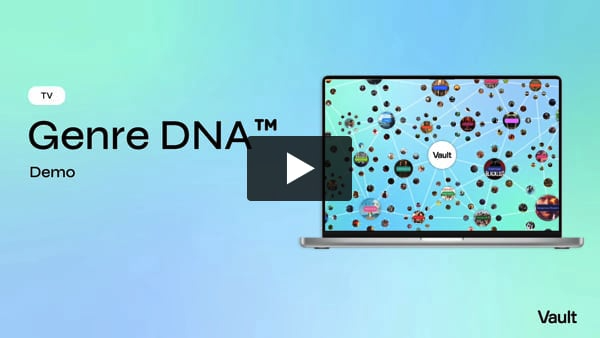Apple TV+ recently premiered an offbeat new sci-fi-action-comedy based on an award-winning book series and it already has critics and audiences buzzing. The series stars Alexander Skarsgård as a sentient and hilariously snarky security cyborg who must hide his secretly-gained free will while protecting a team of scientists as they explore a dangerous new planet.
Here’s what you need to know about Murderbot:
Vault AI uses index scores to describe the impact a given story/theme/element will have on specific KPIs:
≤79 Disappointing 80-89 Challenging 90-109 Average 110-119 Promising 120+ Outstanding
How does this show compare to Apple’s other sci-fi series?
It skews more male. For Murderbot, we’re seeing an audience composed heavily of men (73%) as well as those 30+ (68%). While the show’s age skew matches its streaming brethren, its gender tilt sets it quite apart from Apple TV+’s previous genre entries (Dark Matter, Silo, Hello Tomorrow!, Severance, Invasion, Foundation – all 59-64% men), potentially due to its cyborg-generated action and violence.
Why are so many viewers tuning in?
For the suspense and excitement. The show follows a quirky group of peaceful scientists exploring a potentially lethal alien planet (Dangerous Mission, 130), and audiences are eager to see how (and if) their cynical security robot–the titular Murderbot–will choose to protect them with its built-in weaponry and military-like fighting skills (Stylized Action & Violence, 144). At the same time, Murderbot must hide the fact that it has an internally rich Secret Life (126)–the cyborg hacked its source code and granted itself free will–lest the scientists destroy it for going rogue, adding a whole new layer of tension. The group’s fraught Team Dynamics (145), filled with dramatic irony, are a major selling point for the show as Murderbot considers its approach to working with its humans (Teamwork, 127).
What’s making the show so bingeworthy?
Wry humor. While the action and suspense are bringing viewers in, it’s Murderbot’s dry wit that’s keeping them watching. Events in the show are punctuated by the cyborg’s droll internal monologue as it weighs in on the scientists’ ill-advised choices, flinches away from oddities like human eye contact, and generally comments on the absurdities of humanity (Sarcastic Humor, 136; Twisted Humor, 129; Cynicism, 110). Murderbot’s continual sense of snarky Annoyance (129) (it would rather be watching soapy melodramas on a TV satellite feed than interacting with the team) contributes to the show’s overall comedic sensibility.
How is the show’s social buzz?
Stellar. After the early April trailer produced an “outstanding”-level spike (to 130), the mid-May drop of the first two episodes maxed out our social buzz meter (at 160), where it’s been hovering ever since. This pattern of online activity so far resembles the premiere of Apple’s Silo, currently on its third season.
What will help push this series into a second season?
Murderbot’s evolution. The cyborg’s twisted sense of humor and advanced security capabilities combine with its social awkwardness, generalized anxiety, and aversion to human interaction to create a uniquely memorable character that can easily drive future seasons of the show as it grows and evolves. Its hilariously Awkward Misadventures (121) in dealing with the scientific team and its Inner Conflict (120) between newly-born personal desires and a strange, budding sympathy for humans are key drivers for the series’ longevity.
—
Most Popular Rapid Insights
Redefine your understanding of TV subgenres
Introducing Genre DNA™ – TV subgenres redefined by groundbreaking AI analysis to reveal the true drivers of viewership.
See the insights that others can’t
Genre DNA™ goes beyond traditional TV genre classifications by analyzing over 1,000 scripted and unscripted series on both linear and SVOD platforms from the last 5 years.
Each Vault Genre DNA™ report offers a precise analysis of your chosen TV subgenre, uncovering its unique drivers of viewership.
*Publicly released trailers for series are evaluated using Vault’s algorithms – utilizing our proprietary 120K+ story element database alongside viewership performance and other datasets – to identify unique combinations of stories, themes, characters, and genre elements that will drive success.




